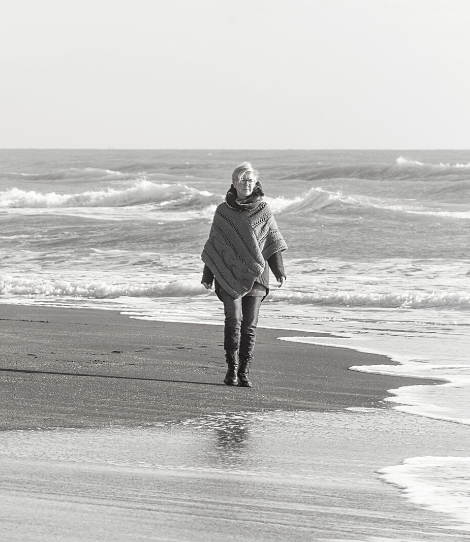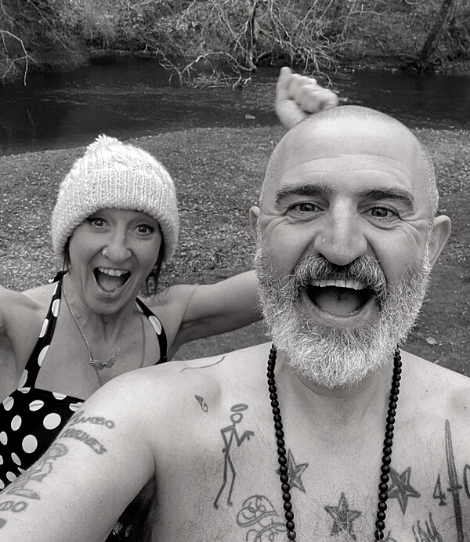We owe it to ourselves to look after our bodies and brains. By starting in midlife — with a few simple habits — we can change the way we age. Good health doesn’t require heavy-duty workouts or restrictive diets or expensive salon treatments. More often than not, it’s the small everyday actions that help us age well: particularly when they work cumulatively, reinforcing each other.
Forget trends. Follow the research
Wellness gurus tell us that true health will only be ours if we follow the latest diet or workout routine. These programmes risk leaving us exhausted and depleted. And if we give up, we feel guilty and depressed. But seven years of research for our blog, agewellproject.com has shown us that the reverse is true: it’s the smallest steps which often have the biggest effect.
This doesn’t mean we can spend all day on the sofa watching telly and eating Hobnobs, however appealing that might seem. Many of the illnesses and impediments we associate with old age – diabetes, dementia, osteoporosis, heart disease – take root in midlife, only revealing themselves decades later. Now is the time to take responsibility for our future health. Discovering what’s right for us as individuals is key to this: we need to focus on rebalancing priorities to make time, even just a few minutes, to work towards feeling good about ourselves.
5 things to start doing now
Research published in the British Medical Journal in 2020 credited five “low-risk lifestyle factors” with providing an extra 10 years of “healthspan” – the good years left to us. They were: not smoking, not being overweight, doing 30 minutes of moderate to vigorous exercise a day, having a moderate alcohol intake, and eating a good quality Mediterranean-style diet. These five factors may sound extremely basic or an impossible ask. The point is that taking action, however tentative, to achieve them will make a huge difference.
Extra movement is key to good health
Thank the Lord we don’t need to chop wood, bake bread and turn mangles like our foremothers. But our sedentary, desk-bound lives need to change. Replacing half an hour of sitting with low-grade movement – like cooking or gentle walking – is linked to a 24 per cent reduced risk of death from cardiovascular disease. We gain the benefits of extra movement at a cellular level: one report found that women who were sedentary for more than 10 hours a day had shorter telomeres – the shoe-lace-tip like caps which protect our DNA – than women who exercised more.
Pay attention to inflammation
Further research found that just 20 minutes of exercise reduced inflammation in the body. Inflammation is so detrimental to ageing that scientists coined the term “inflamm-ageing” to illustrate the congruence between the two. The longest, largest randomised control trial (the gold standard for medical research) into the impact of exercise on longevity found that intense bursts of HIIT exercise in the gym conveyed no advantage in terms of all-cause mortality, cardiovascular disease, or cancer in older adults. The Norwegian researchers behind the report concluded that regular moderate exercise – like a walk or a bike ride – was as helpful as sweating it out in the gym.
In the years we’ve spent researching and writing The Age-Well Project, we’ve discovered many simple activities which improve our fitness. Some we can do while we’re queuing, brushing our teeth or making a cup of tea. Others take a little more time. All can be squeezed into the busiest of days. We’ve listed our 10 favourites below.
10 hacks for moving to a longer happier life
1. Stand on one leg while cleaning your teeth. One minute on each leg will improve your balance, vital for preventing falls as we age. Try brushing with your non-dominant hand for an added brain boost.
2. Find a 15-minute yoga session on YouTube. Not only is yoga calming and strengthening, but a new study suggests that stretching is as good for our hearts as our muscles, enabling vital arteries to open and extend. Heart disease is the leading cause of death for women.
3. Our muscles wither rapidly as we age. Use every opportunity to lift and carry: walking with bags of groceries, carrying logs, digging the garden, taking out the bins, can all help preserve and build muscle.
4. Use queuing and waiting time to build muscle. Calf lifts are the easiest: rise up onto the balls of your feet, lower, repeat. Hold your abs tight to add a discreet workout for your core.
5. Keep a pair of weights by the kettle. Before each cuppa do a few shoulder presses, one of the best exercises for upper body strength.
6. Improve your walking pace by leaving slightly later than normal for meetings and appointments. The additional sense of urgency will ensure you keep your pace brisk. The faster we walk, the greater the benefits.
7. Before you leave for your daily walk, jump 10 times (if your bones and ligaments are up to it). Jumping is one of the best possible ways of building bone density, crucial for avoiding osteoporosis.
8. Want to work your brain as hard as your body? Turn off Netflix and learn to dance. Dancing is good for both body and soul – but for a full brain workout you need to master new steps. Start with the Charleston by following a YouTube class.
9. Layer up your activities. Use that brisk walk to come into contact with nature, even if it’s the local park. Researchers describe short bursts of outside time as ‘nature pills.’ In Scotland, GPs already prescribe nature walks as an antidote to stress and depression.
10. Still tied to your desk? Take a moment between tasks to stretch and move. Stand up every 40 minutes, and whenever you speak on the phone. Embrace your inner wriggly child and fidget as you work. Research into the movements of over 12,000 women found that fidgeters lived longer.
health
View All
Picture: Getty Images
Why it’s important to think about ageing well
The women behind the Age-Well Project share their enlightening Manifesto

Would you rather be thin, or happy?
After dieting and purging for years, Daisy Buchanan asks what really matters

Picture: Getty Images
Skin hunger: Understanding the need to be touched
Lynn Ruth Miller has a satisfying life. She just needs to be touched.



